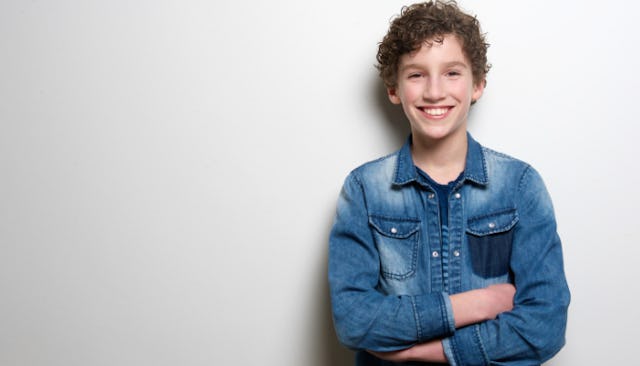The Night My Tween Son Wasn't Cool Enough

On that warm summer night, as I caught a glimpse of my 12-year-old son, I knew.
He was standing across the yard, a plastic plate filled with summer party food in one hand, a red plastic cup in the other. The sun hit his hair in just a way that I could see the blond highlights from a summer spent frolicking in the pool. His gangly tween legs seemed to lack direction and his arms made his plate seem extra small.
He scanned the party, standing forlornly in the grass and trying to look purposeful. I watched his awkward stance, the position of his shoulders, the look on his face. Other kids ran by him, a group of tweens stood gathered in a corner across the yard, and families laughed and joked. The summer sun cast a warm glow on that hot summer evening, and as his eyes met mine across the yard, I knew what had happened and what he was feeling.
A mother knows.
I walked over to him and gently ruffled his hair. “Are you OK?” I whispered. His hazel eyes looked at me with pain and confusion.
“They don’t want me to hang out with them, Mom. They ignored me. I tried to talk to them several times, but they just kind of looked at me and walked away.”
My heart broke in two, right then and there, as the insects whizzed by my head and the humidity soaked into my skin.
I looked across the yard to the kids in question, the kids who had deemed my precious, beautiful, gangly son not good enough for them. The ones who had callously shunned him with no regard for his feelings. I saw gangly legs, awkward stances, and acned faces, all grouped together, a small little gang. But when I looked more closely, I saw the children who used to play with my son in grade school, who used to barge into my home to build Legos and drink juice boxes and have snacks in my kitchen. Children who’d played with him at recess and sat next to him in class. Children who my son considered friends.
Children who now turned their backs on him because he wasn’t cool enough.
And my heart broke again.
My first instinct was to go into Mama Bear mode. I would fix things. I would march over to the group of kids and remind them to play nicely. I’d bring my son over with me and encourage conversation, point out a toy or game they could all try together. Then I’d walk over to their mothers and laugh about how kids can be so silly sometimes. Their mothers would call over to them to “Play nice!” and “Don’t forget to share!” and we’d all toast each other with our cocktails.
But then I remembered: He’s not a toddler anymore. Mommy can’t fix things. Mommy shouldn’t fix things.
And my heart ached.
I put my arm around him and said, “Come on. You can hang out with your father and me.” He looked at me in anguish. “Mom, seriously?”
I struggled to figure out the best course of action. Should I take him home? Should I make him face the music and suck it up because this is what tweens do? Do I make him suffer the embarrassment of hanging out with his less than cool parents? In this moment, this space in time I’d been warned was coming, I had a choice to make.
I scanned the party for my husband and walked over to where he was making small talk. I whispered to him what had happened and described my dilemma. We looked at each other, both new to the tween parenting game, and knew we had to do what was best for him in that moment.
We feigned excuses, gathered our things and took our sweet boy home.
When we got home, we declared an immediate Family Movie Night. I dug out one of my favorite ’80s teen angst movies, Some Kind Of Wonderful, to show the kids for the first time. In the movie, the social misfit boy from the wrong side of town winds up getting the girl of his dreams, only not the one he originally set out to woo. With the help of John Hughes’s storytelling magic, he gets the girl and a new social status and becomes comfortable in his own skin, all in around 120 minutes.
As the movie credits rolled, I looked over at my son, and he gave me a lopsided grin. “I know why you showed this movie to me, Mom. Thanks.”
He stood up and wrapped his lanky arms around me, whispering, “I’m going to be OK. You are taking this harder than I am, I think.” He squeezed me once more before he walked up to bed, shoulders a little higher, stance a little less awkward.
And my heart smiled.
This article was originally published on